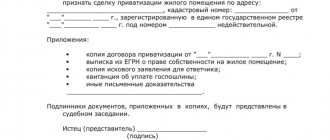An agreement for the transfer of ownership of an apartment is a basic legal concept that covers a whole range of transactions. Rights to residential real estate can be transferred to citizens as a result of donation, sale, or exchange. In a non-professional environment, the term refers to privatization agreements. Individuals receive premises free of charge or for a fee. The mechanism was developed to implement Art. 40 of the Constitution of the Russian Federation.
- Legal basis
- Which apartments can be privatized
- What documents will be required
- How to draw up an apartment transfer agreement
What it is?
A privatization agreement is a document on the basis of which an apartment that previously belonged to the municipality or, less commonly, to the state is transferred to citizens. It is concluded between two parties:
- Local government, which previously owned housing and provided it to citizens under a social rental agreement.
- The tenants with whom the housing code was signed in accordance with the procedure provided for by the Housing Code of the Russian Federation entered into a social rental agreement for residential premises.
After the paperwork for privatization is completed, a copy of the agreement remains in the hands of the citizen. It is on the basis of this document that the subsequent registration of rights to the apartment takes place with the Rosreestr authorities.
Attention : Drawing up an agreement does not require certification by a notary. State duty is also not charged.
Peculiarities
Each case has its own nuances:
- A document can be declared invalid due to any violations only within a year after its conclusion.
- Inheritance of a part in an apartment after the death of one owner will be in accordance with the legal order, and not on the basis of residence in it.
- If there is an error in the written text - date of birth, personal data, then you must contact the authority that issued the document for correction. The corrected version must be submitted to Rossreestr for review.
- If the sole owner dies and there are no heirs, then the apartment returns to the ownership of the municipality.
- It is impossible to evict a homeowner, even if he is a persistent defaulter of utility bills.
- Payment for utilities will be slightly higher for owners than for tenants.
- Family members who refuse privatization, after signing the agreement, will no longer be able to change their decision and take ownership.
How is it processed?
Regarding the form of the agreement, the Civil Code of the Russian Federation and the Law of the Russian Federation “On the privatization of housing stock in the Russian Federation” establishes only one requirement: the agreement must be drawn up in writing . In practice, local authorities often approve a standard form of agreement used in a particular municipality.
If the contract form has been approved, its preparation, in essence, comes down to only filling out the empty columns with the necessary information. This is usually done by specialists from the relevant departments of local authorities involved in the management of municipal property.
However, the law does not prohibit the use of independently prepared contracts . If all the necessary conditions and information are indicated, even an agreement that the citizen prepared independently can be accepted and signed.
Registration procedure and content
The agreement is drawn up at the last stage of the privatization process, when all the necessary documents are collected by citizens, transferred to the municipality and verified there by authorized employees. In general, the procedure looks like this :
- A legal or other municipal service prepares the text of the document with all the necessary information.
- Citizens who wish to participate in privatization sign an agreement.
Those who previously gave a written refusal to register ownership of a share in the apartment do not participate in the signing. - Signed copies of the agreement are divided. One remains in the archives of local authorities, the second is later transferred to Rosreestr. The remaining copies in an amount equal to the number of residents who signed the agreement are given to them.
The contents of the agreement itself include the following:
- “Hat” with the name of the agreement, its number, date and place of drawing up.
- Indications on the parties to privatization - the local government authority represented by the head of the municipality (or another person who has been given the appropriate powers) and citizens registered in the transferred apartment.
- Description of the apartment indicating its area, address and other significant characteristics.
- An indication that the transaction is free of charge.
The latter is especially important, since in addition to the Law of the Russian Federation No. 1541-1 concerning the privatization of housing stock, Federal Law No. 178 “On the privatization of state and municipal property” is also in force in Russia . In accordance with the provisions of this act, citizens can obtain ownership of an apartment not only through free privatization, but also by purchasing it from the local authorities.
Do I need to register?
After the agreement is signed by the parties, it must be taken to Rosreestr or MFC for registration. However, in this case, it is not the contract itself that is registered, but the new rights that arose on its basis.
In fact, during privatization, one party (the municipality) loses the right of ownership of housing, and the other (one or more residents who previously lived in the apartment on the basis of social rent) acquires this right. It is the transfer of rights that must be registered and entered into the Unified State Register of Real Estate.
Possible problems and their solutions
What to do if there is an error in the text?
There are no ideal people who don't make mistakes. Local government employees preparing contracts are no exception. What can you do if there is an error in the text of the contract?
You can correct the situation as follows:
- If the registration of the right has not yet been completed, you can destroy the old copies of the agreement and sign new ones, without errors.
- You can conclude an additional agreement, indicating in it exactly what correction is being made to the text of the agreement.
- Finally, if the error is significant and prevents you from registering the right, you can go to court. In this case, an application to establish the fact is submitted in the manner established by the Code of Civil Procedure of the Russian Federation. In particular, this is practiced if everything in the text of the document is correct, but the name of one of the new homeowners is misspelled, and it is unrealistic to bring everyone together to re-sign the contract or agreement thereto.
IMPORTANT: If the error concerns shares in the right to an apartment, then the court remains the only option.
The same procedure is provided for when renting housing, that is, you can conclude an additional agreement. agreement to the lease agreement.
If concluded, but the right is not registered
Another common situation is when the parties have successfully signed a document, but the registration of the right in the Unified State Register through Rosreestr has not yet taken place. In this case, the only way out is to contact the registration authorities (directly or through the MFC) and finally complete the procedure.
In 1993, the Plenum of the RF Armed Forces established that registration must be carried out no later than 2 months after signing. However, now the current regulations have changed significantly - and it is almost impossible to monitor compliance with this requirement.
However, it is better not to delay the registration procedure . Citizens must remember that before entering information into the Unified State Register of Real Estate, they cannot call themselves the owners of the apartment, just as they cannot make any transactions with it - even rent it out for commercial rent.
If registration is delayed due to the fault of local authorities or Rosreestr employees who unreasonably refuse to register the right, the issue can be resolved by filing a petition with the court.
Is it possible to terminate?
The legislation allows not only to privatize an apartment, but also to terminate the contract. This is possible in the following situations:
- The contract was initially concluded with violations. In this case, it is terminated through the court at the request of the interested party.
- Voluntary termination occurs (“deprivatization”, deprivatization). In this case, the owner of the property does not actually terminate the contract - he enters into a new one on the transfer of the apartment back to the ownership of the municipal authorities.
In turn, deprivatization usually occurs for the following reasons:
- A citizen discovers that he cannot financially maintain an apartment. The fact is that property tax is paid on owned housing (Chapter 32 of the Tax Code of the Russian Federation). For housing, it is paid at the cadastral value - and it is now increasingly approaching the market value. In addition, the owner pays for major repairs and maintenance of common property. The resulting amount could be significant.
- Safety. Lonely elderly people often become victims of scammers and so-called “black realtors” if they own apartments. To get rid of the threat, some of them prefer to return the housing, which there is no one to bequeath, back to the ownership of the municipality.
- Chance to get more living space. Citizens who own housing do not participate in local programs to improve housing conditions. Therefore, returning an apartment and living in it again on the basis of social rent is an opportunity for many to take part in such a program.
The deprivatization procedure is as follows:
- The owner (or owners, if there are several of them) of the apartment writes an application to the local government authority. In the application they indicate that they wish to transfer the apartment into municipal ownership free of charge.
- Municipal specialists consider this issue within no more than 30 days and either agree to deprivatization or refuse it. The law does not provide for the possibility of forcibly taking back housing.
- A new real estate transfer agreement is signed.
- The newly emerged property right is registered in the Unified State Register of Real Estate.
IMPORTANT : A deprivatized apartment cannot be re-privatized!
Termination procedure
If for some reason the new owners decide that they do not want to be them, they can carry out the reverse process and terminate the contract. This process is called deprivatization. The basis for this procedure may be violations committed in the execution of the contract. There are 2 ways to implement it:
- Application to the municipality with a request to terminate the existing agreement.
- A lawsuit is filed in case of refusal by the authorities.
It will not be possible to return everything back if the following facts exist:
- at least one of the owners does not support this initiative;
- housing is pledged under a loan agreement;
- a minor citizen took part in privatization;
- the applicant owns other housing;
- after the conclusion of the contract, other residents were registered.
Attention! If a person terminates such an agreement, he will never be able to obtain free ownership of either this or any other public housing.
How to get a duplicate?
In the event that the contract itself is lost, a citizen can receive a duplicate of it . To do this, he needs to submit an application to the relevant local authority.
In addition, if privatization took place recently (that is, before 2004, when the modern registration service was formed), one copy of the agreement may be available in the Rosreestr archive. If necessary, you can request a copy there too.
Finally, if all documents are completely lost, which is extremely unlikely, the contract can be restored and ownership of the apartment recognized in court.
Comment on the rating
Thank you, your rating has been taken into account. You can also leave a comment on your rating.
Is the sample document useful?
If the document “Agreement for the transfer of residential premises into ownership (Privatization Agreement)” was useful to you, we ask you to leave a review about it.
Remember just 2 words:
Contract-Lawyer
And add Contract-Yurist.Ru to your bookmarks (Ctrl+D).
You will still need it!
Grounds for invalidation
In some situations , the agreement under which the apartment was privatized may be challenged in court and declared invalid. This is possible in the following cases:
- Minors were not included in the privatization. The law does not provide for the possibility of refusing privatization even with the consent of the guardianship authorities.
- The agreement was signed by a person who did not have full legal capacity due to health or age.
- The citizen who entered into the contract acted under duress or was misled.
- On the part of the administration, the document was signed by an employee who did not have the authority to do so.
There may also be other grounds provided for by the rules of the Civil Code of the Russian Federation regarding the invalidity of transactions.
A specialist talks about invalidating a privatization agreement:
Is it possible to challenge privatization?
Leave a comment on the document
Do you think the document is incorrect? Leave a comment and we will correct the shortcomings. Without a comment, the rating will not be taken into account!
Thank you, your rating has been taken into account. The quality of documents will increase from your activity.
| Here you can leave a comment on the document “Agreement for the transfer of residential premises into ownership (Privatization Agreement)”, as well as ask questions associated with it. If you would like to leave a comment with a rating , then you need to rate the document at the top of the page Reply for |










